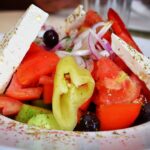Experts now agree that the defining attribute of the Mediterranean diet is the Mediterranean lifestyle and not the other way around. The Mediterranean diet is based on the style of meal preparation and eating patterns of people living around or near the Mediterranean Sea. It focuses on food ingredients that include fruits, vegetables, fish, whole grains and healthy fats. What’s interesting about this diet is that it’s ancient and isn’t invented like most modern diet programs, but discovered. Most health experts agree almost unanimously that it is one of the healthiest dietary patterns in the world!
UNESCO defines the Mediterranean diet as “a social practice based on all the ‘savoir-faire’”, knowledge, traditions, cultures, harvesting patterns, methods of food conservation, food processing, food preparation, cooking and how food is consumed. It is most known for its ability to reduce the risk for heart disease; however, it has more health benefits to offer. I personally think that UNESCO should also make the Mediterranean lifestyle a world heritage.
The Discovery
It was Ancel Keys of the University of Minnesota who discovered the Mediterranean Diet in the 1950s. He was intrigued by its particular health benefits based on his observations after studying in Copenhagen, Denmark. During one of his research, he studied the health and lifestyle of the poor people in Southern Italy and made clinical comparisons to the wealthy folks living in New York. To his astonishment he found out that the Italians had lower bad cholesterol levels as well as fewer people with cardiovascular diseases compared to the people in New York! It was also from this discovery that he developed the famous K-rations.
5 Core Tenets of the Mediterranean Lifestyle
1.) Follow the Mediterranean Diet
I’ve talked to Europeans living in Italy, Greece, Turkey, Libya, Egypt and Morocco and their daily lives basically goes like this:
- Bread made from whole grains topped with cheese, fresh red tomato slices, and drizzled with some extra virgin olive oil for breakfast.
- For lunch they sometimes have vegetarian pizza topped with carrots, green peppers, onions, roasted broccoli, and part-skim mozzarella cheese; or Greek yogurt with strawberries, oats and nuts.
- They ate fish or seafood for dinner, often with a side of rice or grains and a fresh chopped salad.
- They would chomp on fresh vegetables, a handful of raw nuts, or even a bowl of lentil soup for snacks.
But they’re not ignorant about chocolate bars, cakes and pastries, as a matter of fact, they are aware of almost all Western food as well as famous recipes from other countries, it’s just that they prefer their regional diet over it. What an amazing culture these Mediterranean people have! We should all aspire to live the Mediterranean lifestyle like they do.
2.) Spend Time with Family and Share with your Loved Ones
The whole idea about the Mediterranean diet is not about food at all, but rather about enjoying the food with family and friends. Have you ever noticed it? Food seems to taste a whole lot better when you’re dinning and sharing food with your friends and loved ones? According to this article, eating together with friends or family has surprising health benefits. The primary health benefit of eating together leans more towards mental health, but if you follow the Mediterranean diet, then it will have other health benefits for your entire body also.
3.) Move Naturally
It’s ironic to think that the reason why Americans love to go to the gym and get fit is, because of an ancient Greek philosophy about how important it is to be fit and healthy. The Olympic Games itself was to test the physical fitness of the athletes that participate in it. Greeks are known to follow the Mediterranean diet too! In fact, they have several recipes featured in Mediterranean diet websites and blogs, yet if you’ll go around the Med and ask people there, you’ll be surprised that most of them don’t go to the gym to workout. That’s just not how their minds work and that’s the beauty of the Mediterranean lifestyle – nothing is forced on you. Everything comes as natural.
Despite this they are very active people! You will often find them walking to and from work, the farmer’s market, visit their neighbors and friends, or the dairy shop for a fresh Greek yogurt. Sometimes they do it leisurely (they walk for the fun of it), or they ride their bicycles but these type of activities burns a lot more calories than when you go jogging or run in the treadmill. And more importantly, these people who follow the Mediterranean diet are not afraid to eat when they get hungry from all that walking or physical activities, because they eat more nutrients than carbohydrates – meaning the chances of them getting fat is low.
Talk about getting the best of both worlds!
4.) Laugh Often
If you recall the second tenet of the Mediterranean lifestyle is eating food with friends and family, right? Well, what do you think happens when you’re having a meal with the people you love and have known for a long time in your life? Fun and laughter that’s what! When you’re having fun and laughing while in the company of your loved ones and friends your brain releases naturally-occurring chemicals called dopamine, oxytocin, and endorphins. These are known as happy hormones that promote positive feelings like pleasure, happiness, and even love.
These hormones often trigger a higher metabolic rate which in turn helps your body absorb the nutrients from your food better. So you see, science proves that being happy, having fun and laughing truly is the best medicine! The Mediterranean diet becomes a supplementary element in this case.
5.) Live More – In Other Words, Live Simply as This is the Most Important Tenet of the Mediterranean Lifestyle
Mediterranean people and Americans have contrasting life concepts and have very different cultures and beliefs. Any American visiting the Med and starts to learn the culture there will find it strange that people live life to the fullest, yet they live in simplicity. They have far fewer possessions than the average American would have and this stems from their belief that having too much will also make you anxious. They love to eat fresh foods and they don’t mind making multiple trips to the market to buy the ingredients – on foot, mostly.
They also do very well in reducing their waste like, for example, in their fattoush recipe they use a day’s old bread to make it, or the paella where leftovers are turned into a rice dish that rivals the most delicious meals you can find in restaurants.
Are you thinking about making that Mediterranean lifestyle change now? Well, by all means, please do! As this is going to be good for you.








7 Responses
Hi, all the time i used to check weblog posts here
early in the daylight, because i like to gain knowledge of more and more.
These are in fact fantastic ideas in regarding blogging.
You have touched some fastidious points here. Any way keep up writing.
Hi! I could have sworn I’ve been to this site before but after browsing through some of the post I realized it’s new to me. Anyways, I’m definitely happy I found it and I’ll be bookmarking and checking back often!
A person essentially assist to make significantly posts I’d
state. This is the very first time I frequented your web
page and thus far? I surprised with the analysis you made to make this actual publish amazing.
Great activity!
It¡¦s actually a great and useful piece of information. I¡¦m satisfied that you simply shared this helpful information with us. Please stay us up to date like this. Thanks for sharing.
Muchos Gracias for your blog.Really thank you! Much obliged.
Pretty nice post. I just stumbled upon your weblog and wanted to
mention that I have really loved surfing around your
weblog posts. After all I’ll be subscribing for your rss feed and I am hoping
you write once more soon!